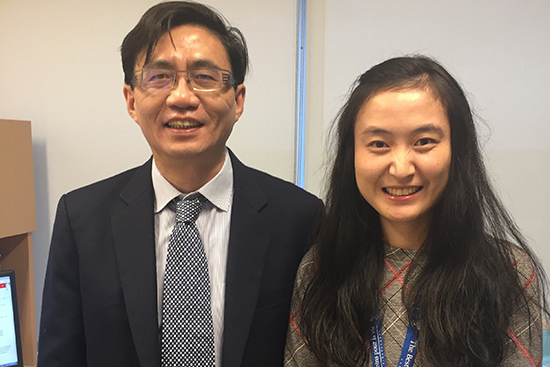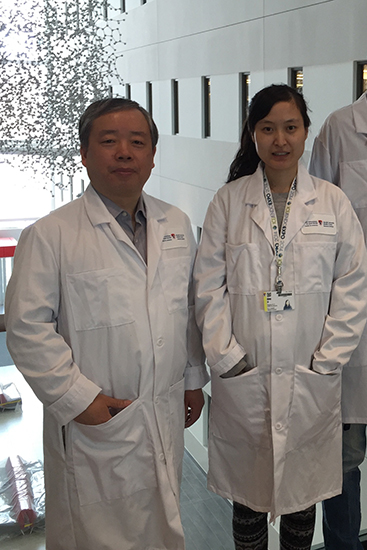Researchers identify a protein that could help in the early diagnosis of pancreatic cancer

Dr. Zu-hua Gao (left) and graduate student Qing Li)
Researchers at the Research Institute of the McGill University Health Center (RI-MUHC), showed for the first time that a group of protein, called Regenerating proteins, were involved in the early stages of Pancreatic ductal adenocarcinoma (PDAC). PDAC is the most common type of pancreatic cancer and is the fourth leading cause of cancer-related deaths. Due to its deep anatomical location, tumour-specific symptoms typically occur only when it has already reached an advanced stage.

Dr. Jun-Li Liu (left) and graduate student Qing Li
Regenerating proteins are involved in the proliferation and differentiation of diverse cell types and are important in protecting cells from death caused by damage or inflammation. Dr. Zu-Hua Gao and Dr. Jun-Li Liu found that PDAC patients had elevated levels of Regulating proteins in their serum and in the cancer tissue.
“Our findings can help in the early diagnosis of pancreatic cancer which will improve survival, can help in monitoring therapeutic response, and/or predicting patient’s prognosis. We are currently testing in animal models and in cell cuture environment. If we can significantly suppress the malignant behavior of PDAC by targeting Regulating proteins, this new therapy could potentially save thousands of lives.” states Dr. Ga, also Pathologist-in-Chief at the MUHC.
For more information on this discovery:
http://publications.mcgill.ca/medenews/2016/12/01/new-marker-identified-for-pancreatic-cancer/
About the study
Regenerating proteins promote acinar-to-ductal metaplasia and act as novel diagnostic and prognostic markers in pancreatic ductal adenocarcinoma. Oncotarget 2016 Oct 24. doi: 10.18632/oncotarget.12834.
About the RI-MUHC
The Research Institute of the McGill University Health Centre (RI-MUHC) is a world-renowned biomedical and healthcare research centre. The Institute, which is affiliated with the Faculty of Medicine of McGill University, is the research arm of the McGill University Health Centre (MUHC) – an academic health centre located in Montreal, Canada, that has a mandate to focus on complex care within its community. The RI-MUHC supports over 460 researchers and close to 1,300 research trainees devoted to a broad spectrum of fundamental, clinical and health outcomes research at the Glen and the Montreal General Hospital sites of the MUHC. Its research facilities offer a dynamic multidisciplinary environment that fosters collaboration and leverages discovery aimed at improving the health of individual patients across their lifespan. The RI-MUHC is supported in part by the Fonds de recherche du Québec – Santé (FRQS). rimuhc.ca
